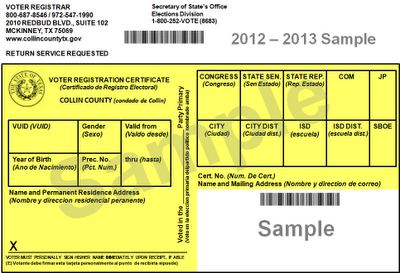Everything You Ever Thought You Wanted To Know!
Join the
Texas Democratic Women of Collin County on Thursday, April 5, 7-9 pm at Collin College – Frisco Campus, 9700 Wade Blvd., Building J, Rm. J113 for an evening of exciting discussion regarding the ever-changing Texas Primary and conventions!
 Be A Delegate to the 2012 Collin Co. Democratic Convention at the Plano Centre in Plano, Texas! (map)
Be A Delegate to the 2012 Collin Co. Democratic Convention at the Plano Centre in Plano, Texas! (map)
Any registered voter who signs an oath of affiliation with the Texas Democratic Party at convention check-in or during the convention may participate. To be a Delegate just check into the convention during registration from 8:00 am to 10:00 am on Saturday April 21 using your Voter Registration Card, Driver's License or other identification used for voting.
- Learn how the new maps will affect you!
- Find out how you can become a delegate at the County Convention on April 21st without going to a precinct caucus!
- Find out about the Primary Election scheduled for May 29th!
The session is free and open to the public – RSVP to
events@tdwcc.org.
In normal primary election years the Texas Democratic and Republican Parties conduct their respective Senatorial District or County Conventions three weeks after primary election day and after Election Precinct Conventions, which are normally held during the evening of primary election day.
It's all different this year! This year, drawn out court battles over the new redistricting maps have pushed primary election day from its usual first Tuesday in March date to Tuesday May 29.
Since the Democratic and Republican Parties were already locked into holding their respective state conventions the weekend of June 9 - just over one week after the rescheduled May 29 primary date - they asked the San Antonio three-judge panel to issue an order allowing them to hold their respective SD/County conventions in April, five weeks before the primary election.
This year, the Texas Democratic Party convention and national presidential delegate selection process will skip the preliminary Election Precinct Conventions and begin with
County/Senatorial District Conventions on Saturday April 21, 2012. SD/County delegates will be elected to advance to the June 7-9
Texas Democratic Party State Convention at the George R. Brown Convention Center in in Houston, Tx, where delegates will be elected to advance to the
Democratic National Convention in Charlotte, NC.
This year, any registered voter who signs an oath of affiliation with the Texas Democratic Party at convention check or during the convention may participate in their County/Senatorial District Convention as a delegate. People who sign an oath of affiliation with the Texas Democratic Party -- which they would normally do when voting in the party's primary election -- cannot participate in another political party’s process, or vote in another party's primary election until after December 31, 2013, when the party affiliation cycle resets for the 2014 primary year.
Any person eligible to participate in the delegate selection process may qualify as a candidate for National Convention delegate and alternate by filing a
National Delegate Statement of Candidacy form with the Texas Democratic Party State Chair, State Democratic Executive Committee, 505 W. 12th Street, Austin, Texas 78701. Statements of Candidacy must be submitted no earlier than April 16, 2012 and no later than 5:00 p.m. on May 15, 2012 (Rules 12B & 14F).
Often overlooked because it is so early in the process, this form MUST be filed if you have any intention (even if you ultimately decline) to run for National Delegate. This isn't a change cause by redistricting, but it's worth highlighting.
Statements of Candidacy must be submitted on forms approved by the State Democratic Executive Committee and must contain the individual's name, mailing address, residence address, day and night phone numbers, email address, a pledge of support to the Democratic nominee for president, an oath of affiliation with the Democratic Party and a signed pledge of support to the individual's presidential preference (or uncommitted status) or an oath that the individual is currently uncommitted.
Related:
Democratic Party County/Senatorial District Conventions On For April 21






